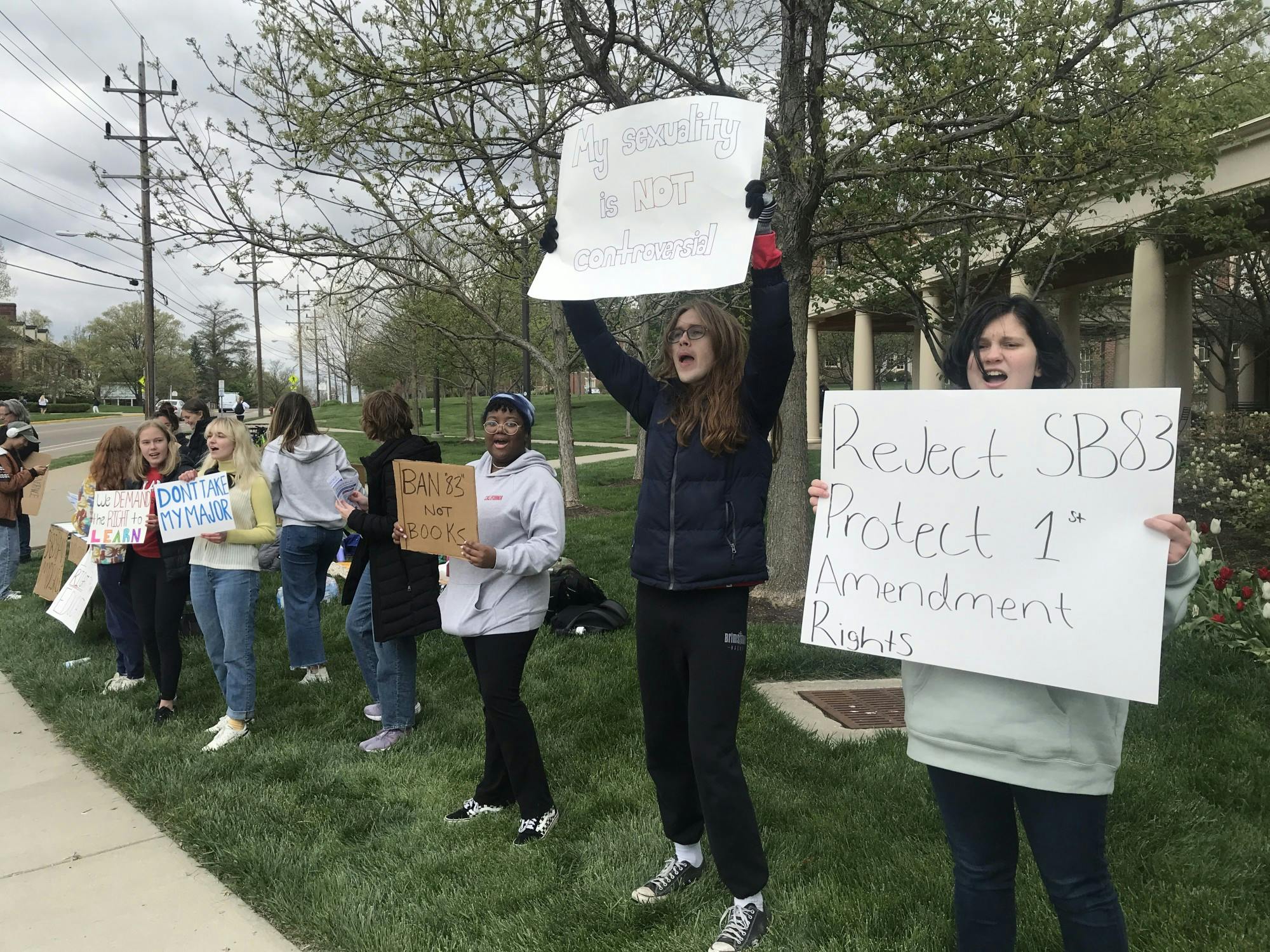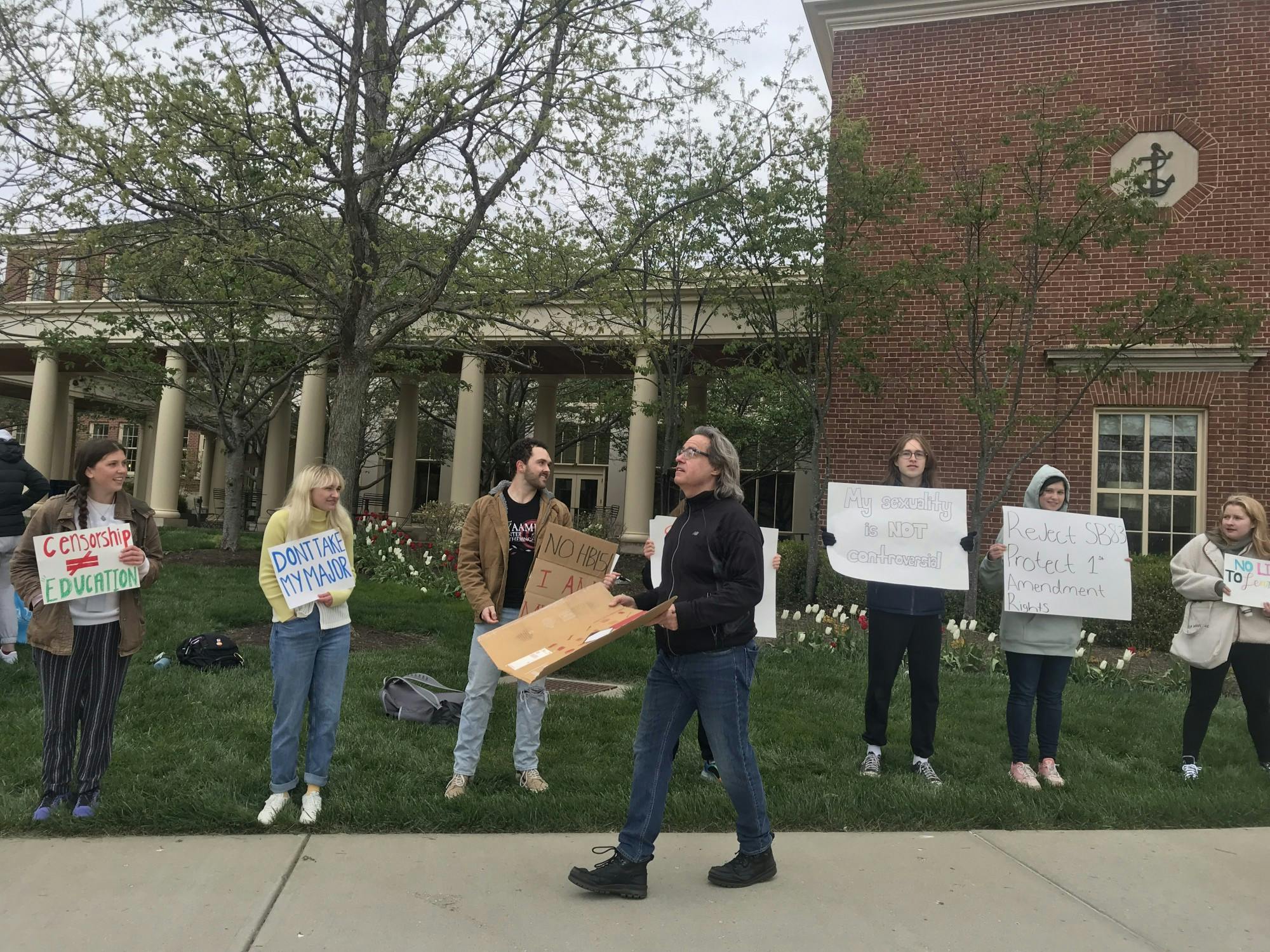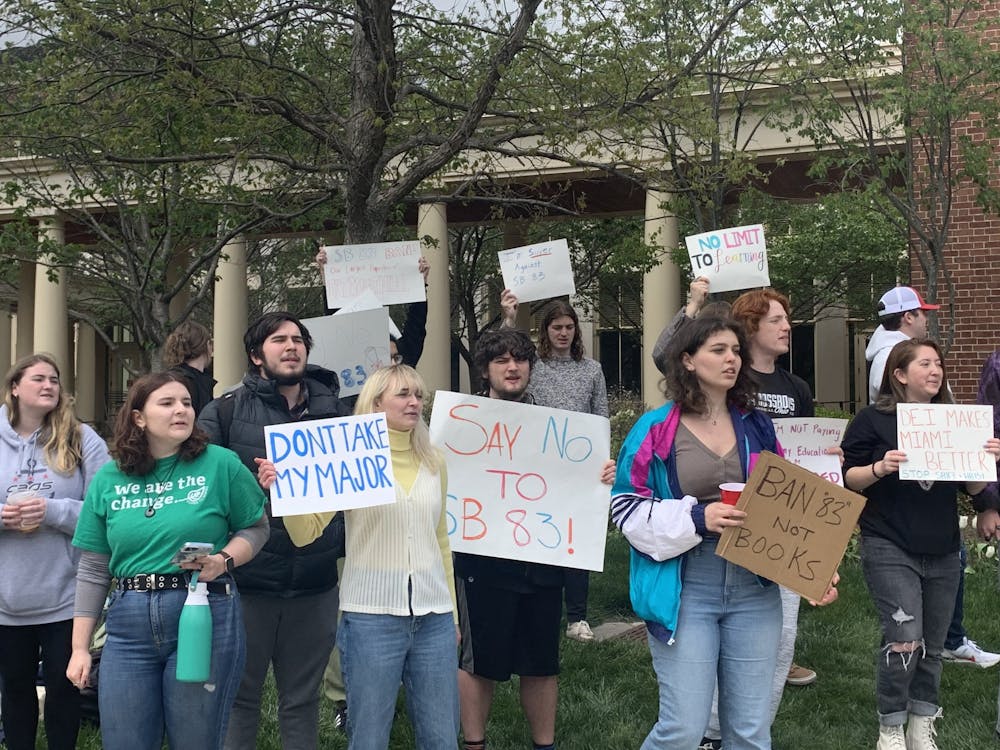Chants of “S.B. 83 bans my degree” echoed outside Miami University’s Armstrong Student Center on Monday as students, faculty and staff waved signs, passed out flyers and called state senators to protest Ohio’s Senate Bill 83 (S.B. 83) and House Bill 151 (H.B. 151).
If passed, S.B. 83 would limit diversity, equity and inclusion (DEI) training, require an American government and history course for students, outline who can and cannot strike and prohibit professors from discussing controversial topics in class.
The bill defines controversial topics as “any belief or policy that is the subject of political controversy, including issues such as climate change, electoral politics, foreign policy, diversity, equity, and inclusion programs, immigration policy, marriage, or abortion.”
S.B. 83 has a mirror bill in the House, H.B. 151, which is currently in the House Higher Education Committee.
Olivia Gallo, a first-year organizational leadership and social justice major, came up with the idea to protest and asked her social justice class to see if other students were interested. Ashley Reynolds, a first-year social justice major, had recently read an article about the bill and offered to help Gallo organize the event.
“I saw an article online talking about a bill in Ohio restricting college education of divisive topics, and I remember reading through it and going like, ‘OK, so if this bill passes, I literally lose my major,’” Reynolds said.
Reynolds is an out-of-state student from Chicago and came to Miami for its robust criminal justice program. She said if S.B.83 passes and eliminates her major, she will be forced to transfer schools.
“We have an incredible community here, and I’m so excited to spend my four years here and study social justice," Reynolds said. "And I’m absolutely horrified to see this could potentially not happen if this [bill] gets passed, and I might have to leave Miami."

During the protest, students held handmade signs as they shouted chants like "S.B. 83 bans my degree."
Although there are other ways to advocate against the bills, such as writing and calling state senators, Gallo said the easiest option for students is to protest.
“We decided that the best thing for students to do was going to be protests, so we decided to pull this together so we could show student support against the bill and how it will affect all of us,” Gallo said.
Enjoy what you're reading?
Signup for our newsletter
Gallo said this protest was important to her because S.B. 83 targets DEI in the classroom, which has been enriching during her time at the university.
“As a student … my education has been bettered by diverse conversations in my social justice classes where I hear the experiences of others,” Gallo said. “But I think that cutting off those conversations and silencing those voices is the worst thing we could be doing for education.”
Gallo and Reynolds took inspiration from their class with Mark Curnutte, a visiting assistant professor of social justice and inequalities, to organize the protest. Curnutte teaches about protests and social justice movements and was eager to help the students organize the event.
“We just felt that it was seamlessly part of the curriculum,” Curnutte said.
Although most of S.B. 83 and H.B. 151 target conversations in the classroom, Curnutte emphasized that the bill will affect activities outside the classroom as well, even for faculty.
“Many of the faculty have expressed their concern about this because another piece of this [bill] is faculty unionization … so S.B. 83 affects all of us,” Curnutte said.

Mark Curnutte, a visiting assistant professor of social justice and inequalities, worked with Miami students to organize a protest outside Armstrong Student Center against Senate Bill 83.
S.B. 83 prohibits “employees of any state institution of higher education” from striking, and the bill would limit the power of faculty unions.
Rodney Coates is a professor of critical race and ethnic studies at Miami, which would be eliminated if the bills pass. He said the bills are specifically damaging to student discovery, which endangers history.
“It's important because they want to indoctrinate you and tell you this is what the truth is,” Coates said. “We want you to discover the truth. Discover the truth in terms of LGBTQ+, in terms of Blacks, in terms of Hispanics, in terms of Native Americans … if we don’t tell those stories, then we’re doomed to repeat the same mistakes over and over again.”
Caleb Collins, a senior biomedical and engineering student, attended the protest after hearing about it in Curnutte’s class. Collins is a part of the Myaamia Heritage Program at Miami, and he is worried the program will be cut because of the bills. Collins said the program has helped him learn about the Myaamia culture, language and contemporary issues affecting the tribe.
“S.B. 83 would ban diversity and inclusion education at this campus … and the [Myaamia Heritage Program] offers money and a lot of other resources for students to come here so they can learn about being Myaamia,” Collins said.

Caleb Collins is part of the Myaamia Heritage Program at Miami. Collins worries the bill would affect this program if passed.
Collins said the Myaamia Heritage Program has been instrumental in teaching him more about his identity and is worried that if these bills pass, other Myaamia students won’t have the same opportunities.
Students, faculty and staff protested outside of Armstrong from 10 a.m. to 4 p.m., and Reynolds said she was impressed with the turnout.
“I heard chanting all the way down the street,” Reynolds said, “and I saw somebody walking by with the flyers that people are handing out, and I was just absolutely in awe.”




